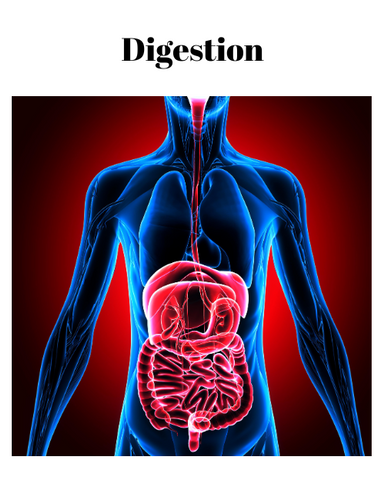10 Herbs To Help Indigestion And How To Use.
Feb 22nd 2023
Introduction: The Nuts And Bolts Of The Problem

Digestive issues are one of the most common complaints that people face on a daily basis. Indigestion, specifically, can lead to significant discomfort and can affect daily life. Fortunately, there are ways to address the root causes of indigestion and alleviate its symptoms. In this blog, we will explore 9 common causes of indigestion and how to fix them.
Eating Too Quickly:
Eating too quickly can be a cause of indigestion as it leads to excessive air intake and can cause bloating and discomfort. To avoid this, try to eat slowly, take small bites, and chew your food thoroughly before swallowing. This allows for better digestion and can reduce the likelihood of indigestion.
Eating Spicy or Fatty Foods:
Spicy and fatty foods can also be a cause of indigestion. These types of foods can slow down digestion and lead to discomfort. If you are prone to indigestion, try to limit your consumption of spicy and fatty foods. You can also try to eat smaller portions or avoid these foods altogether.
Consuming Alcohol:
Consuming alcohol can lead to indigestion as it can irritate the stomach lining and cause inflammation. To avoid this, try to limit your alcohol consumption or avoid it altogether. If you do decide to drink, try to do so in moderation and make sure to stay hydrated.
Smoking:
Smoking can also be a cause of indigestion as it can irritate the stomach lining and cause inflammation. Quitting smoking can be beneficial for your overall health and can also reduce the likelihood of indigestion.
Eating Before Bed:
Eating before bed can lead to indigestion as lying down can cause stomach acid to flow back into the esophagus. To avoid this, try to eat at least 2-3 hours before bedtime. This allows time for digestion and can reduce the likelihood of indigestion.
Stress:
Stress can also be a cause of indigestion as it can lead to increased levels of stomach acid and can slow down digestion. To reduce stress levels, try to practice relaxation techniques such as deep breathing, meditation, or yoga. You can also try to incorporate regular exercise into your routine as this can help to reduce stress levels.
Medical Conditions:
Certain medical conditions such as gastroesophageal reflux disease (GERD) or peptic ulcer disease can also be a cause of indigestion. If you suspect that you have a medical condition, it is important to seek medical advice from a healthcare professional.
Medications:
Certain medications such as nonsteroidal anti-inflammatory drugs (NSAIDs) or antibiotics can also be a cause of indigestion. If you suspect that your medication is causing indigestion, it is important to speak with your healthcare professional. They may be able to adjust your medication or provide alternative options.
Food Sensitivities:
Food sensitivities can also be a cause of indigestion. If you suspect that you have a food sensitivity, try to identify which foods are causing the problem and avoid them. You can also speak with a healthcare professional or registered dietitian for further advice.
There are surely more factors that can cause digestive issues, but lets start with these.

Solutions:
Here are ten herbs that maybe able help with indigestion and how to use them:
Ginger: Ginger can be consumed fresh, dried, or in tea form. To make ginger tea, steep a few slices of fresh ginger in boiling water for 10-15 minutes, then strain and drink.
Peppermint: Peppermint can be consumed as tea or taken in capsule form. To make peppermint tea, steep a peppermint tea bag or a handful of fresh peppermint leaves in boiling water for 5-10 minutes, then strain and drink.
Fennel: Fennel seeds can be consumed as tea or chewed after meals. To make fennel tea, steep 1-2 teaspoons of fennel seeds in boiling water for 5-10 minutes, then strain and drink.
Chamomile: Chamomile can be consumed as tea or taken in capsule form. To make chamomile tea, steep a chamomile tea bag or a handful of fresh chamomile flowers in boiling water for 5-10 minutes, then strain and drink.
Turmeric: Turmeric can be consumed as a spice in food or taken in supplement form. To use as a spice, sprinkle turmeric on your food or mix it into a smoothie or soup.
Dandelion: Dandelion root can be consumed as tea or taken in capsule form. To make dandelion tea, steep a dandelion tea bag or a handful of fresh dandelion roots in boiling water for 10-15 minutes, then strain and drink.
Licorice: Licorice root can be consumed as tea or taken in capsule form. To make licorice tea, steep a licorice tea bag or a handful of fresh licorice roots in boiling water for 5-10 minutes, then strain and drink.
Cinnamon: Cinnamon can be consumed as a spice in food or taken in supplement form. To use as a spice, sprinkle cinnamon on your food or mix it into a smoothie or oatmeal.
Lemon balm: Lemon balm can be consumed as tea or taken in capsule form. To make lemon balm tea, steep a lemon balm tea bag or a handful of fresh lemon balm leaves in boiling water for 5-10 minutes, then strain and drink.
Milk thistle: Milk thistle can be taken in capsule form or as a tincture. Follow the dosage instructions on the package.
As with any herbal remedy, it's important to consult with a healthcare professional before using them if you have severe or chronic indigestion or any underlying health conditions.
References:
https://www.pennmedicine.org/for-patients-and-visi...


